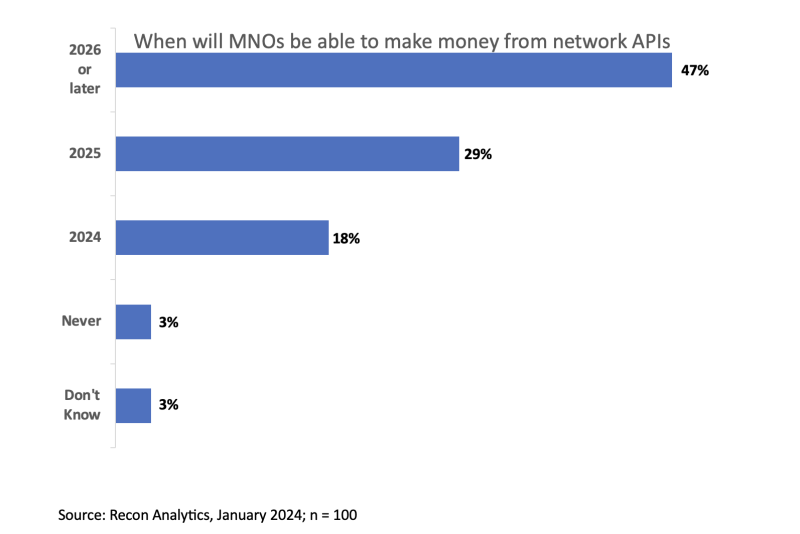
The GSMA kicked off the 2023 MWC by announcing the launch of its network API Open Gateway initiative. The objective of Open Gateway is to help standardize network APIs. This should make it easier for developers to create applications and help mobile operators monetize their networks. For an industry in the middle of a major investment cycle due to 5G, and still looking for ways to monetize that investment, it is easy to see why network-APIs was one of the major stories of last years' MWC. As we head to the 2024 version of MWC, it is a good time to examine how well the promise of network APIs has resonated with mobile network operators and what this year’s MWC needs to accomplish to maintain existing momentum.
In early 2024 overall awareness of network APIs and how those APIs could benefit MNOs appears high. In Recon Analytics’ two most recent mobile operator surveys we asked respondents if their companies had started to develop a network API strategy. On average 80% of respondents said yes. Regionally, mobile operators in Middle East/Africa had the highest positive response to the network API strategy question at 87%, followed by North America at 85%, Europe at 84%, and Asia Oceania-based MNOs at 77%. In the second half of 2023 we started to see MNOs move beyond strategy creation and take more definitive steps toward network API monetization.
Since mid-2023 there have been multiple operator announcements about the availability of network APIs or partnerships to develop them. Announcements include four mobile operators in Sri Lanka (Bharti Airtel, Dialog Axiata, Hutchison Telecommunications, and SLT-Mobitel), three in Brazil (Brazil Claro, TIM Brasil, and Vivo), and three in Spain (Orange, Telefonica, and Vodafone). In September Nokia jumped on the network API bandwagon with the announcement of its network-as-code platform and application developer portal, and subsequently picked up Dish Networks and BT as partners. Since September Ericsson has announced network API agreements with Deutsche Telekom and Verizon using the Vonage platform.
The current level of MNO network API activity is encouraging, but it is the next step in turning strategies and partnerships into actual money where the outlook for network API monetization gets murky. And it is this next step, monetization, that will decide the future of network APIs.
Last October, Ericsson announced it was reducing the value of its $6.2 billion Vonage acquisition by $2.9 billion. Part of Ericsson’s rationale for purchasing Vonage was to use it as a platform to monetize network APIs. This financial adjustment does not mean Ericsson believes there is no market for network APIs, just that it will take longer to materialize than initially forecast.
Based on our research and operator discussions at Recon Analytics, there are reasons to be concerned. Forty-seven percent of respondents said it would be at least 2026 before MNOs would be able to make money from network APIs. Another 29% said it would be at least 12 months before network APIs could deliver revenues.
The full breakout of how long respondents thought it could take before they start making money with network APIs is in the following chart.

To me this indicates those operators have a positive outlook on the subject but see multiple challenges that need addressing before they see revenues from network APIs. Three challenges of note are:
- Application Developer Support: 61% said getting application developers interested in network APIs will be a challenge. As one MNO told me, application developers still need to feel comfortable working with the APIs before any talk of monetization schemes can begin.
- Compensation: 68% said they were worried that the majority of network API generated revenues will go to platform providers and application developers. This is a legitimate concern given the number of partners needed in delivering an application across multiple mobile operator networks.
- Network Security: While mobile operators say they need third-party partners to make network API monetization successful, MNOs are also worried about exposing their networks to those third parties. Thirty-seven percent said network security was a risk, while 26% were concerned about exposure or loss of sensitive company and network data.
Network APIs should once again be a major MWC theme this year, but the topics discussed will change. I expect the three challenges listed above will drive this year’s conversation. They all need addressing or the outlook to when network APIs will start to generate revenues will continue to move further into the future or worse become never. If the latter happens, network APIs will be just another industry over-hyped topic that generates little financial benefit, and MNO’s will miss out monetizing their biggest asset – their networks.
Daryl Schoolar is a director and analyst at Recon Analytics where he focuses on telecommunication service providers and companies that provide networking communication solutions to those service providers. Some of the topics he covers are digital transformation, 5G, 6G, cloud networking, and telecom service strategies.
"Industry Voices" are opinion columns written by outside contributors—often industry experts or analysts—who are invited to the conversation by Fierce staff. They do not necessarily represent the opinions of Fierce.